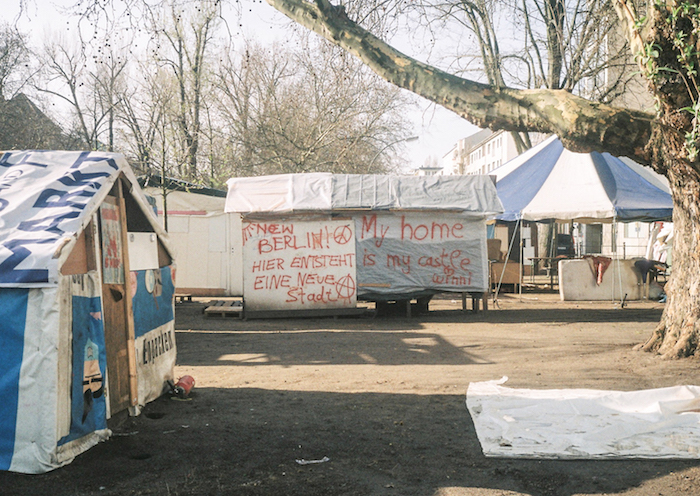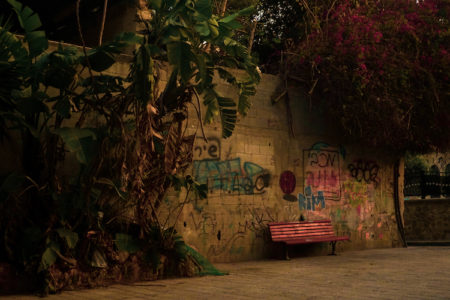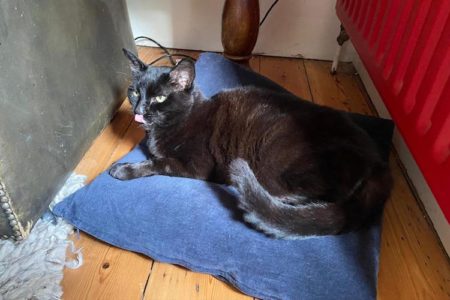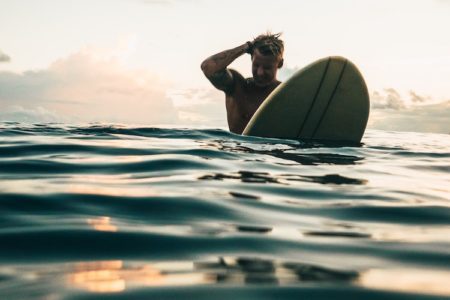Why we’re here: A journey from Damascus to Berlin

Reading time: 10 mins
By Alice Austin
Chapter I: Leaving Damascus
Mohamad grins as he tells me “My cousins also came by boat but from the west. Each one suffered in a different way. The thing that annoys them the most is that I got on the ship without getting any water on me. They were like ‘Wait, what? You go from the shore, to the boat without water? Then the boat and the ship without water? How did you do it?’ And I say ‘we had a 5-star trip!’”
Mohamad is describing friendly banter between him and his cousins after they arrived in Germany in 2014. In fact, Mohamad’s journey from Damascus to Berlin was ‘5-star’ in comparison to other journeys, although it’s still beyond my imagination.
I’m sitting in a Syrian Cafe on a Tuesday evening in the Berlin borough of Neukölln. Mohamad has ordered us a selection of traditional sweets. He is friendly and open and delighted to be sharing his Syrian heritage. He explains each sweet as we begin to eat it – “this one is called The Sweet of Cheese but there is no cheese in it.”
Mohamad is 26 years old. He was studying mathematics at the University of Damascus when he was forced to flee Syria in 2013. He fled as he could no longer study after he failed three semesters in a row due to the war preventing him from accessing his university.
In Syria, if you’re a young man and not studying then you must join the military. Mohamad received a letter telling him this shortly after failing his third semester. “I didn’t tell my mother because I knew she would push me to get out the country. We had just lost our oldest brother [in a siege] and the youngest we had kicked out of the country because he was active and his name started to be known. We feared that he will be captured and put in jail so we tricked him to get out of the country.” Amongst all this, Mohamad decided to keep quiet about the letter telling him he would be joining the military in five months’ time.
Mohamad and his younger brother didn’t want to leave Syria. They wanted to stay so they could be active and help give their country a future. But once your face and name becomes known, the government will capture you and put you in jail. I asked Mohamad how they could have room for all of the people who were imprisoned. “They make room” was his chilling response.
Just read any account of a Syrian prison and you’ll understand that going to one is not an option, and Mohamad certainly wasn’t going to join the military. Mohamad was part of a team of people who were filming the attacks and bombings in Syria and putting it online so people could see what was happening. His face was never caught on camera, but he was taking an active role in revealing the atrocities of the Syrian government and if he was caught, he would be thrown into jail. As a student, it was easier for him to move around and capture evidence.
Mohamad waited and allowed the deadline for an excuse not to join the military to pass. But then his father found the letter and was devastated. He went straight to the military offices and gave them money, begging them to push back the deadline for when Mohamad would join.
“I had a huge argument with my mother.” Mohamad explains. “She said even if I stay I can’t stay active because I would need to go to the military. I knew I wouldn’t join, my mother said I won’t be able to move [around Syria] anymore. At this point there would be a list and my ID would show that I’m not attending so they would take me anyway.” Mohamad had no choice but to leave.
“At that point my father and youngest brother were working in Libya. My brother called me and said there’s a great opportunity for a job here that he needed me to work on. I thought he was lying. Then he told me that our father is working with his hands which is a tough thing for a man of his age. He said, at least come and be a chauffeur for our dad.”
Shortly after this conversation a letter came through to say that his request to postpone joining the military had been approved. “So then I thought maybe it’s destiny.” With his mother breathing a sigh of relief, Mohamad left for Libya the following week.
His brother hadn’t been lying, there really was an excellent job opportunity for them. They were put in charge of a new internet company, a thriving business that they had the liberty to run by themselves. “We worked 13 hours a day because there was nothing else to do. Just work and sleep. There’s nothing that gives you the safety to go and enjoy life. If you want to go to the beach there is nobody there, nothing to give you a feeling that you can enjoy.”
At the time, Europe wasn’t even on their radar as a place to go. Then in 2014 the Islamic militant group Ansar al-Sharia attacked the Government-supported Libyan rivals in the city of Benghazi, turning the Northeastern city into a warzone. Mohamad and his brother’s plans to expand the internet business were put on hold as their cousins and friends decided to leave for what was then the complete unknown – Europe.
Chapter II: The Five Star Trip
“At that point, my brother and I said no. We would never give away all our money and go in a boat into the unknown. My work wasn’t depending on anyone; it was internet; it was like water for people. People ask for water and then Wi-Fi, so I thought I would keep working. But a lot of my cousins didn’t have work and it wasn’t safe to work anymore. They lost their jobs. They had to go. At that point the place they knew they could live, and the rumour at the time, was Europe. We didn’t know what the smugglers would do with the people. People don’t care and will go through with it.”
Then the situation in Libya became much, much worse. The owner of the internet company, an American-Libyan, laid his cards on the table to the brothers.
“He said “tell me, if you’re going to leave then I’ll sell the company. If you’re determined to stay, I’ll stay with you.”” The brothers had a long discussion about their future and decided that they too would leave for Europe. Their cousins had arrived and had sent them images documenting every step of the way. Although they knew how dangerous their journey would be, they at least knew there would be safety and a future for them.
“From Benghazi to Western Libya, that was the normal way. But we were trapped in Benghazi. My parents were in Turkey so we thought we could go there. We tried to book a flight to get out but there was no way. We couldn’t drive out, we couldn’t take a bus, there was no way to get out.”
He didn’t tell his mum that he was going to make the journey to Sicily because he didn’t want to worry her. As they were stuck in Benghazi, Mohamad and his brother didn’t have connections to the smugglers that dominated the Western coast. So he and his brother decided to pool their money with Syrian friends and buy a boat from a fisherman they were familiar with in Benghazi.
“We went to the fisherman and we said we need this boat. When he found out what we were going to do with it he tripled the price. Because the price was so high we decided to take 300 people in that boat instead of 100 people.”
It was the third boat to leave Benghazi, and the fishermen who Mohamad knew personally had already started to adopt the mindset of a smuggler. By the time Mohamad’s boat was ready to leave the fisherman had already bought weapons to protect his boats.
“We were smuggled in the dark, stayed in a closed van for ten hours and were taken in groups to the harbour. And this is the people that we know. With the smugglers it is much worse than that. I was angry because I knew these guys, I worked with them. We were being treated in a special way, and this is the best way that they treat people. So you can imagine how bad it is for other people. With real smugglers it is much, much worse. They have been doing this for years, it’s not their third trip.”
The professional smugglers are much less humane than that. According to a report published in late 2016, Libya’s coastal cities are making up to £273m in revenue each year from people-smuggling. Tens of thousands of refugees leave Libya in unseaworthy boats, telling aid workers once rescued that they handed over their life savings to the smugglers.
“The good thing was that we were 300 adults and 50 children and we knew each other, and we could calm each other. The main reason a boat sinks is because people panic, and if you know each other you can calm each other. The other main reason a boat sinks is because of the weather. If it is bad, the boat will shake, people will panic and the boat will collapse.”
That is if you survive the militia who patrol the coast who might shoot at the boat. Mohamad continues “So we escaped one of the main reasons the boat sinks. The second one was that we stayed on the shores for 24 hours to find the best weather, then when we got on the boat the sea was very calm, people were calm and the boat kept working until we saw a ship that would rescue us.”
This was an Indian-Canadian oil ship. After ten hours on their boat, the driver called the Italian coast guard to let them know they were coming towards Italy and they needed help. The Italian coast guard said that their closest coast was Libya, and that if they were in critical condition they should go back. That couldn’t happen, so they waited another 15 hours to call the coast guard again.
They waited another 15 hours for the Indian-Canadian oil ship to arrive. Once rescued they stayed on this ship for a further 2 days until they finally reached Sicily.
Surviving the trip across the Mediterranean Sea is only the very first step in a long, unbelievably arduous journey to being able to live a life free of the terrors of war. Once they reached Italy, Mohamad made the phone call to let his mother know that he had arrived safely in Europe. She had no idea he and his brother had even left Libya, but was relieved when she found out they were safe.
Mohamad and his fellow passengers then had to stand for a full 16-hour journey on a train from Sicily to Milan. Once there an organisation helped them find shelter for two nights, after which Mohamad and his brother went to Berlin where they registered for asylum.
Mohamad good-humoredly tells me that he is a movie expert – but understanding why is far from amusing. He and his brother were sent from Berlin to Hamburg to wait for asylum. They stayed in a camp for 7 months alongside 3000 other refugees with nothing to do and no way of knowing when it would end.
“It’s more boring than you can imagine. Happily, I brought my laptop with me, so I had it all day long. We had shifts, my brother and I, 8 hours while the other slept. If there’s a film ranked good on IMDB, I have seen it.”
There’s no work to be done, no studying, and no possibility to learn the language of your destination. It is a slow torture. All Mohamad could think to do that would be productive was to watch films all day long to improve his English.
“To this day I just know 3 people out of the 3000 in the camp. I felt trapped in myself. I thought there is no point. It won’t improve anything; everyone is in the same situation. We will just make each other worse and miserable.”
Eventually, after 7 months of waiting and not knowing, Mohamad and his brother were granted the right for asylum and moved to Berlin. They then stayed in camps for another 8 months until they could find an apartment.
“We knew it would be hard and would take a while, at least two years, to feel you are on the ground and can start to build your life again. So people even walked here because they thought this could be a fresh start.”
Chapter III: Why we’re here
I met Mohamad on his walking tour of Berlin called ‘Why We’re Here’. On it Mohamad tells of the war in Syria as he leads listeners through the streets of central Berlin, comparing historic sites to Syrian history to give under-informed people (like me) an accurate viewpoint of what has happened and is happening.
The tour ends in Mohamad’s brother’s Syrian restaurant, Mandi, where we eat delicious, authentic Syrian food. Something that helps Mohamad and many refugees normalise their new surroundings is food.
“You can imagine people had their own life, their own way of living for a long time. They feel they had a certain place in this community and then they lost it. You come here, there are people here who want to help you, some people hate you. Everybody was going to food because this is what we know, and everyone agrees on it. I don’t know any other things to feel part of being here. The first thing I did when I got here was go to a cooking group. Just to go and feel your part of something, something you can do and you know how to do.”
The importance of food to create community is clear as you dine at Mandi. The custom of sharing is one that reflects the generosity of Syrian culture. Large plates are placed in the center of the table so everyone can enjoy a variety of food together. This is starkly different to the Western norm of ordering one main dish and having it all to yourself.
Mohamad met his friend Lorna at a group cooking class when he left the camp in Berlin. Lorna is the founder of Refugee Voices Tours and co-founded an incredible social project called JumpStart, a Berlin-based project that brings together locals and newcomers to provide orientation, support and motivation for new arrivals in Berlin. She encouraged Mohamad to begin his walking tour.
“I would never have imagined to do them on my own. I never would think it could actually happen, just me typing on Facebook “come and join me” and they turn up. We did the first tour and 15 people showed up. I thought okay, maybe it will go for a week or a month. And for every week 15, 17, 20 people show up. And I start to look forward to that day. It’s the main thing that gives me the feeling that I’m active again and making a difference from here.”
Mohamad’s walking tour is an excellent way of learning about the war in Syria and the decades of conflict that have led Mohamad and thousands of others to leave their country. It’s refreshing to get genuine insight into why refugees are coming to Europe without the propaganda of the tabloids we read every day. I ask Mohamad what his reaction is to the negative press that refugees receive across Europe.
“We need to look to the numbers. Why people start to go so far and far. Whenever you’re forced to move country you go to the closest one so that you can go back whenever you can. That’s why there are 6 million people around Syria. Lebanon, Egypt, Turkey and Jordan still has the biggest number, because they think whenever this stops, we’ll jump back in. Then when this doesn’t work, people start to go further.
So I had some friends that went to Europe, some went to Saudi Arabia if they can. I went to Libya when I found work there. People go to Algeria or to their friends in Greece or Russia. Some of my friends had family in Malaysia. It is rare to find someone that came to Europe and doesn’t know anyone here. Why would you choose to come here? Did you read about it? Do you know how they’ll treat you? That’s why the ones who came to Europe in 2014, the same time I came, they came as young men who had some money. Why? Because even if you know someone here you’re not sure enough that you can start something here. You can come here, spend all your money, and then get kicked out. You’re not going to bring all the family with you just as a gamble.
You could go, and find what you want, or you could lose everything and leave with nothing. So if you’re just one, you can live through this, even if you’re beaten and lost. You can go back and start again.”
So how can we help the situation? It’s clear that boredom is a huge problem as refugees arrive in Europe and are subjected to months or years of waiting. Normalising day-to-day life in the camps is a simple way to help.
“There are many organisations doing a lot of stuff. JumpStart and Give Something Back to Berlin have many activities. Refugees want help with language, to learn how to communicate with people. They’re still in this crowded place and don’t have a normal home. They stay in a room with 6 other people. It’s okay for a month, 2, 3, 6. But more than that, it drives you crazy. Sometimes now they open schools for children and adults to learn the language. Other than that there is nothing normal about living there. So when you have some activities and some people coming just for no reason, coming to sit with you and write with you. The activity brings back a little bit of normality for those people.”
There are things that Mohamad knows that he will never get back. The atmosphere he had with his friends, his favourite places to go out, where to diffuse, where to eat and drink, meals with his family.
“All of this, it has been abandoned. It’s not that you leave it for a minute and you go back anytime you want. This is what affects me. I might never go back. Or if I somehow go back it won’t be the same feeling. People changed, the landscape changed. And it wasn’t specifically my choice. Wherever you go, there’s a point where you choose where to go. Like you decide to come to Berlin and see different life. I want something new, I want to see the world from a bigger angle.
I always wanted to see the world when I was in Syria. And go out and see more cities, places, countries. But I was forced and I wasn’t ready to go.”
This comparison is one that resonates the most; Mohamad and I are both new to the city but I came here for an exciting new adventure while he was forcibly ejected from his home. Lorna writes eloquently on this stark contrast on in an essay she wrote.
Finally, I ask Mohamad if he is happy here.
“To a certain extent. The main thing that will make me happy the most is to see my family again. Other than that I cannot ask for more.”
To learn more about Mohamad’s Berlin walking tour, visit his Facebook page.
Or visit Refugee Voice Tours to find one in your city.


